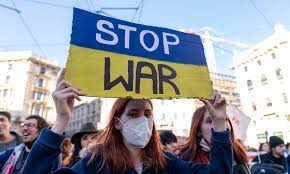
6 avril 2022
Rising prices for energy and certain raw materials, slowing economic growth and turmoil in global financial markets: these are the main economic consequences of Russia's invasion of Ukraine.
With the invasion of Ukraine by Russia on Thursday, February 24, the conflict between the two nations turned into a real war. This could also have serious economic consequences.
Towards a rise in the prices of energy and certain raw materials
11th world power in terms of gross domestic product (GDP), Russia is one of the world's leading exporters of natural gas. It also supplies petroleum, cereals, such as wheat and rapeseed, and industrial metals, such as nickel and aluminum. In this context, one of the first consequences of the war in Ukraine should be an increase in the price of energy and certain raw materials.
On 24 February alone, the price of natural gas rose by more than 25% on the TTF market, a platform located in the Netherlands and considered a benchmark in Europe.
Several factors explain these pressures on energy and commodity prices. First, Russia could voluntarily reduce its offer, in order to exert pressure on the countries, in particular European, likely to impose the heaviest economic sanctions on it. According to a classic market mechanism, with unchanged demand, the price of a good increases when the quantities supplied decrease. On the other hand, in the face of sanctions taken by the United States and Europe, Russia could find itself increasingly isolated and reduce its participation in trade, which would lead other countries to seek alternative sources of energy and therefore more expensive. Finally, the war unleashed in Ukraine could lead to the deterioration of the infrastructures necessary for the export of goods: ports, gas pipelines, oil pipelines, etc.
Towards degraded economic activity and purchasing power
In France, as in many countries, the mechanisms of gas and gasoline price formation are complex and only partly depend on natural gas and oil prices. Rising prices on international energy and commodity markets should, however, cause the acceleration of inflation which made a comeback in the United States and Europe last year.
This acceleration in inflation could have two major consequences:
First of all, it should weigh on purchasing power, i.e. the ability of households to buy goods and services with their income. If inflation is higher than the increase in household income, then purchasing power declines. This is also the scenario forecast by the National Institute of Statistics and Economic Studies (INSEE) for the year 2022. According to forecasts by the Institute published last December, the purchasing power of households should fall in France by 0.2% in 2022. The “additional” inflation generated by the war in Ukraine should aggravate this phenomenon.
The acceleration of inflation could then encourage central banks, including the European Central Bank (ECB) for the euro zone and the Federal Reserve (FED) in the United States, to further tighten monetary policies. In order to limit inflation, they have already announced the forthcoming end of the quantitative easing programs implemented at the start of the Covid-19 crisis, such as the PEPP in Europe, and increases interest rate futures. Due to the war in Ukraine, central banks could accelerate the implementation of these strategies to the detriment of economic activity.
Turbulence in international financial markets
Finally, Russia's invasion of Ukraine has caused turbulence in international financial markets. Most stock markets in the United States and Europe closed lower. Unsurprisingly, the stocks most affected are those most exposed to the Russian market. For France, it is, for example, banking establishments.
On the Paris Stock Exchange, the CAC 40 index fell by nearly 3.8% during the session on Thursday, February 24.
In recent years, Russia, for its part, has tried to reduce its exposure to the international financial system, in particular by considerably reducing the amount of its public debt and by building up foreign exchange reserves. If the United States and European countries were to completely exclude Russia from the international financial system through their sanctions, Russia's economy could collapse.